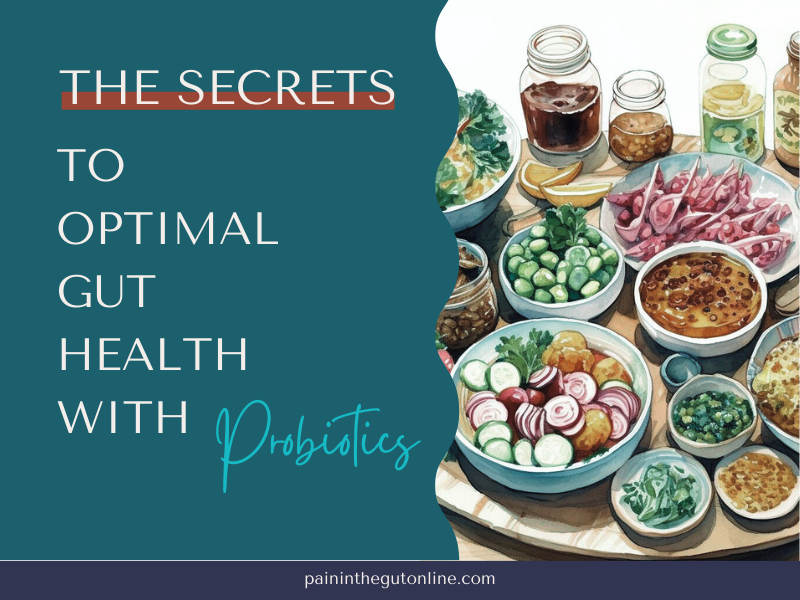GUT HEALTH WITH PROBIOTICS
10 min. read
Learn the secrets to optimal gut health with probiotics and discover the key to improving digestion, boosting immunity & reducing inflammation!

Table of Contents
Introduction to Gut Health
When it comes to your overall well-being, a healthy gut plays a pivotal role.
Your gut, also known as the gastrointestinal tract, is responsible for digesting food, absorbing nutrients, and supporting your immune system. However, various factors can disrupt the delicate balance of your gut, leading to digestive issues and other health problems.
In this section, we will explore the importance of a healthy gut and discuss common digestive issues and symptoms that you may experience.
The Importance of a Healthy Gut
Maintaining a healthy gut is crucial for your overall health and vitality.
A balanced and thriving gut microbiome, which refers to the trillions of microorganisms living in your digestive system, is essential for proper digestion, nutrient absorption, and a strong immune system. A healthy gut can also positively impact your mental well-being and even influence weight management.
A healthy gut helps to:
- Digest food effectively: A well-functioning gut breaks down food, allowing optimal nutrient absorption. This ensures your body receives the necessary vitamins, minerals, and energy to function efficiently.
- Support immune function: The gut is crucial in defending your body against harmful pathogens and foreign substances. A healthy gut microbiome helps to regulate immune responses, reducing the risk of infections and autoimmune disorders.
- Maintain mental well-being: The gut and the brain are closely connected through the gut-brain axis. Emerging research suggests that a healthy gut can positively impact mental health, influencing mood and brain function and even helping to alleviate symptoms of anxiety and depression.
- Regulate metabolism and weight: Imbalances in the gut microbiome have been linked to weight gain and obesity. A healthy gut promotes proper digestion and metabolism, which may aid in weight management.
Common Digestive Issues and Symptoms
Unfortunately, many individuals experience digestive issues that can disrupt their daily lives and overall well-being.
Some common digestive issues and symptoms include:
| Digestive Issue | Symptoms |
| Bloating | Feeling full or swollen in the abdomen – “Oh my god, did I just eat an entire pizza?” |
| Gas | Excessive belching or flatulence – “I just want to be alone after eating.” |
| Constipation | Difficulty passing stools or infrequent bowel movements – “My toilet is so comfy” |
| Diarrhea | Discomfort or cramping in the stomach area – “I just need to lie down for a bit.” |
| Heartburn | Burning sensation in the chest, often accompanied by acid reflux – “Am I having a heart attack?” |
| Abdominal Pain | Excessive belching or flatulence – “I really just want to be alone after I eat.” |
| IBS | Loose, watery stools – “Let’s just move on to the next.” |
If you suffer from any of these symptoms, it may be a sign that your gut health needs attention. Probiotics can help. Probiotics are live microorganisms that provide a range of health benefits, especially for your gut.
Taking care of your gut health is essential for optimal overall health. Addressing digestive issues and incorporating gut-friendly practices can support your gut microbiome and improve your overall well-being. To learn more about improving your gut health through dietary choices, check out our article on foods to improve gut health.
Understanding Probiotics
To rebuild and optimize your gut health, it’s essential to understand the role of probiotics. They are often referred to as “friendly bacteria” because of their ability to support and restore a healthy balance of bacteria in the gut.
What are Probiotics?
Probiotics are primarily composed of different strains of beneficial bacteria and some types of yeasts.
These microorganisms can be found naturally in certain foods and supplements. When eaten, they can help replenish the gut with beneficial bacteria, promoting a diverse and balanced gut microbiome.
Probiotics can be classified into various species and strains, such as Lactobacillus and Bifidobacterium.
Each strain has its own unique characteristics and potential health benefits. It’s important to note that not all probiotic strains have the same effects on gut health, so choosing the right strains is crucial. For more information on gut health supplements, check out our article on gut health supplements.
Benefits to Gut Health with Probiotics
Here are some ways in which probiotics benefit your digestive system:
- Maintaining a balanced gut microbiome: Probiotics help restore and maintain a healthy balance of bacteria in the gut. This balance is essential for proper digestion, nutrient absorption, and overall gut function.
- Enhancing digestion and nutrient absorption: Certain probiotic strains produce enzymes that aid in the digestion of carbohydrates, proteins, and fats. This can improve the breakdown of food and the absorption of nutrients, ensuring that your body receives the maximum benefit from the foods you consume.
- Boosting immune function: Probiotics support the immune system by stimulating the production of antibodies and enhancing the activity of immune cells. More diverse bacteria can help strengthen your body’s defenses against harmful pathogens.
- Reducing inflammation: Imbalances in the gut microbiome can contribute to chronic inflammation associated with various digestive disorders. Probiotics have been shown to help reduce inflammation in the gut, promoting a healthier digestive system.
Probiotics can be added to your routine through probiotic-rich foods and probiotic supplements.
Probiotic-rich foods include yogurt, kefir, sauerkraut, kimchi, and other fermented foods. These foods naturally contain live cultures of beneficial bacteria.
On the other hand, probiotic supplements offer a concentrated dose of specific probiotic strains. It’s important to choose high-quality supplements that contain strains targeted towards your specific gut health needs. To learn more about the gut health diet, check out our article on gut health diet.
Choosing the Right Probiotics
When it comes to improving your gut health, selecting the right probiotics is essential. Here, we will explore the different types of probiotics and factors to consider when selecting the most suitable ones for you.
Different Types of Probiotics
Probiotics come in various strains, each with its own unique benefits.
Some of the most common types of probiotics include:
| Probiotic Strain | Benefits |
| Lactobacillus acidophilus | Helps maintain intestinal health and supports immune function |
| Bifidobacterium bifidum | Aids in the digestion of dietary fiber and supports bowel regularity |
| Lactobacillus plantarum | Assists in the breakdown of carbohydrates and supports overall gut health. |
| Saccharomyces boulardii | Helps alleviate symptoms of diarrhea and supports a healthy gut flora balance. |
When choosing probiotics, it’s important to consider your specific gut health needs. For example, if you struggle with constipation, a probiotic containing Bifidobacterium bifidum may be beneficial. On the other hand, if you frequently experience digestive discomfort, Lactobacillus plantarum could be a suitable option.
Consulting with a healthcare professional or a registered dietitian can provide personalized guidance based on your individual needs.
Factors to Consider When Selecting Probiotics
When selecting probiotics, there are several factors to consider to ensure their effectiveness:
1. Strain Specificity
Different strains of probiotics have varying effects on the body. Be sure to choose a probiotic that targets your specific digestive concerns.
2. Colony Forming Units (CFUs)
CFUs represent the number of viable bacteria present in each probiotic dose. Higher CFU counts generally indicate a more potent probiotic. A probiotic with around 1-10 billion CFUs may suffice for general gut health maintenance. For more severe digestive issues, higher CFU counts may be recommended.
3. Viability and Shelf Stability
Ensure that the probiotic you choose has been tested for viability and has guaranteed shelf stability until the expiration date. This ensures that the bacteria remain alive and effective until the product’s shelf life ends.
4. Quality and Manufacturing Standards
Choose probiotics from reputable manufacturers that follow stringent quality control measures and adhere to Good Manufacturing Practices (GMP). This helps ensure the safety, purity, and efficacy of the product.
Incorporating Probiotics into Your Routine
To optimize your gut health, it’s important to incorporate probiotics into your daily routine. Probiotics are beneficial bacteria that promote a healthy balance of microorganisms in your gut. They can be obtained through both probiotic-rich foods and probiotic supplements.
Probiotic-Rich Foods
One of the best ways to introduce probiotics into your diet is by consuming probiotic-rich foods. These foods naturally contain live bacteria that can support your gut health.
Some common probiotic-rich foods include:
| Food | Probiotic Strains |
| Yogurt | Lactobacillus acidophilus, Bifidobacterium lactis, Streptococcus thermophilus |
| Kefir | Lactobacillus kefiri, Lactobacillus acidophilus, Bifidobacterium lactis |
| Sauerkraut | Lactobacillus plantarum, Leuconostoc mesenteroides |
| Kimchi | Lactobacillus kimchii, Leuconostoc mesenteroides |
| Kombucha | Saccharomyces boulardii, Lactobacillus spp. |
When incorporating probiotic-rich foods into your diet, choosing products containing live and active cultures is important. Look for labels that specifically mention the presence of beneficial bacteria. Additionally, it’s a good idea to start with small servings and gradually increase them to allow your body to adjust.
Probiotic Supplements
In addition to probiotic-rich foods, you can also consider taking probiotic supplements to support your gut health. Probiotic supplements provide concentrated doses of beneficial bacteria in convenient capsule or powder form. These supplements often contain a variety of probiotic strains to enhance the diversity of the gut microbiota.
When selecting a probiotic supplement, choosing a high-quality product from a reputable manufacturer is essential. Look for supplements that specify the types and amounts of probiotic strains contained in each capsule. For more information on gut health supplements, check out our article on gut health supplements.
By incorporating probiotic-rich foods and/or probiotic supplements into your routine, you can support the growth of beneficial bacteria in your gut. This can help improve digestion, boost immune function, and reduce inflammation. However, it’s important to remember that probiotics are just one aspect of maintaining a healthy gut. A well-rounded approach that includes a gut health diet, stress management, and exercise is vital for overall gut health.
Optimizing Gut Health with Probiotics
Incorporating probiotics into your routine can play a significant role in achieving optimal gut health. Probiotics offer several benefits, including improving digestion and nutrient absorption, boosting immune function, and reducing inflammation.
Let’s explore how probiotics can optimize your gut health.
Improving Digestion and Nutrient Absorption
Probiotics can enhance digestion and nutrient absorption by promoting a healthy balance of bacteria in your gut.
They help break down food particles, making it easier for your body to extract essential nutrients. By improving digestion, probiotics can alleviate common digestive issues such as bloating, gas, and constipation.
Furthermore, probiotics aid in the breakdown of complex carbohydrates and fiber, which are crucial for maintaining a healthy gut. They assist in the production of enzymes that break down these substances, allowing your body to utilize the nutrients contained within effectively.
Boosting Immune Function
A significant portion of our immune system resides in our gut, making a healthy gut crucial for overall immune function.
Probiotics contribute to a robust immune response by supporting beneficial bacteria growth and stopping harmful bacteria growth.
By maintaining a balanced microbial environment in the gut, probiotics enhance the immune system’s ability to recognize and combat harmful pathogens. This can help reduce the risk of infections, allergies, and other immune-related disorders.
Reducing Inflammation
Chronic inflammation in the gut can lead to various health issues.
Probiotics have been shown to reduce gut inflammation by modulating the immune response and promoting the production of anti-inflammatory substances.
By reducing inflammation, probiotics can alleviate symptoms associated with inflammatory bowel diseases such as Crohn’s disease and ulcerative colitis. They also play a role in maintaining the integrity of the gut lining, preventing the leakage of harmful substances into the bloodstream.
By incorporating probiotics into your routine, you can optimize your gut health and experience improvements in digestion, immune function, and inflammation reduction. It’s important to consult with a healthcare professional before starting any new supplements or making significant changes to your diet. Together with probiotics, adopting a gut health diet and implementing other lifestyle changes can further support your journey towards optimal gut health.
There are even more steps you can take to improve your digestion and heal your gut. Grab our FREE Beginner’s Guide to Gut Health to learn all about them.






